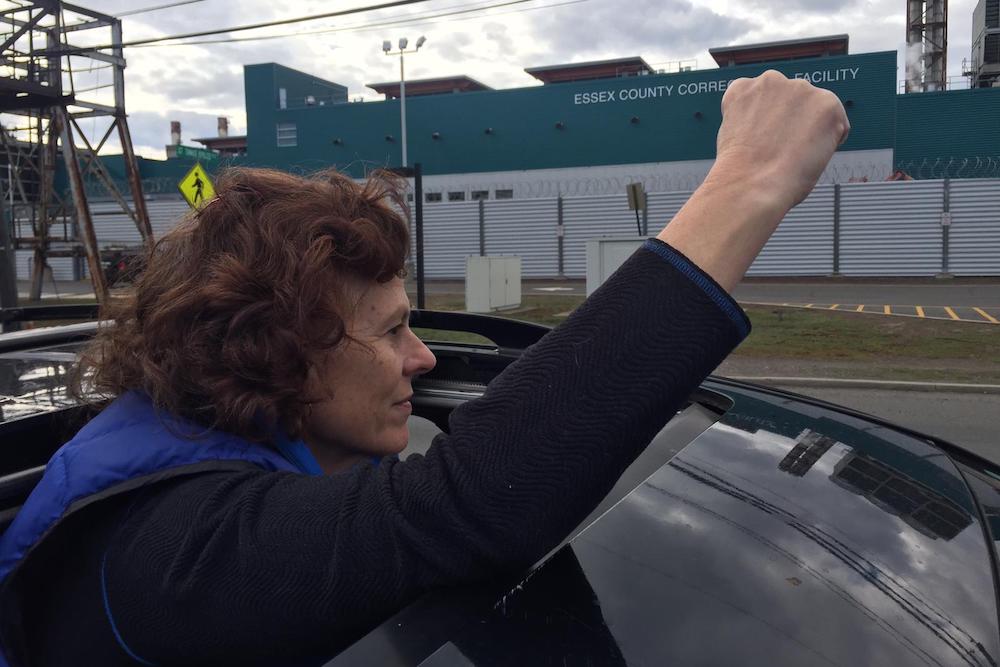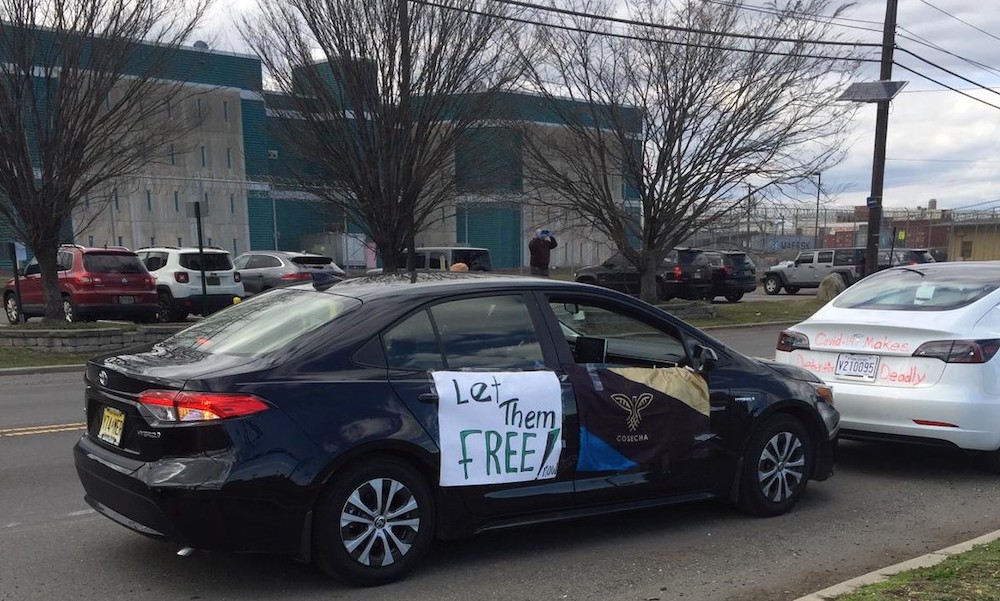
An activist raises her fist in support of releasing immigrant detainees in the Essex County Correctional Facility. She was part of a multi-car drive-by protest in New Jersey April 1. (Courtesy of Pax Christi, New Jersey)
Catholic immigration activists in New Jersey held a driving protest in front of state immigration detention centers in Newark April 1, demanding the immediate release of immigrant detainees after confirmed cases of COVID-19 outbreak within the facilities.
They were joined by faith leaders, political activists, community members and other social justice organizations.
"We've been hearing from families that many detainees are getting sick. There is no way to practice social distancing in the cells — the bunk beds are not 6 feet apart. They are not getting gloves, masks or hand sanitizers because it's considered contraband," said Kathy O'Leary, from Pax Christi New Jersey.
Other groups who participated in the protest included Action 21, Central Jersey Coalition Against Endless War, Central Jersey Democratic Socialists of America, Cosecha New Jersey, Green Party New Jersey, Jobs & Equal Rights for All, Lazos America Unida, NJ5 Indivisible and Never Again Action.
Advertisement
Around 30 cars with activists drove through the streets, beginning from the Peter W. Rodino Federal Building in Newark to the Essex County Correctional Facility near Newark Bay, stopping to honk and sloganeer outside of both. Some displayed posters through the windows, other painted them on their cars.
Last month, advocates wrote to Gov. Phil Murphy and New Jersey Immigration and Customs Enforcement Field Director John Tsoukaris, urging them to release detainees. Panic spread among detainees and families after a member of the medical staff at the Elizabeth Detention Center tested positive for COVID-19.
Meanwhile, 20 miles away, the Hudson County Jail went into lockdown on March 29 after two inmates tested positive for the novel coronavirus. At the time, jail authorities had said that none of the immigrant detainees housed at the facility tested positive.
Another driving protest was held April 6 in Trenton, around the governor's daily press briefing, bringing the total number of demonstrations in the state to five.**
Activists said authorities have done little to improve sanitation inside the facilities, with many detainees going without soap and sleeping in common dormitories. All visits from family and attorneys have been suspended for the time being, owing to the outbreak of the virus.

Activists in about 30 cars drive down the streets in New Jersey in as part of a protest held April 1 demanding New Jersey Gov. Chris Murphy free all immigrant detainees, after positive cases of COVID-19 were reported in state detention centers. (Courtesy of Pax Christi, New Jersey)
Joining the protest on April 1 were family members and friends of the detainees. Nina J*, whose husband has been in the Essex Detention Facility since July 2019, said immigrants were being treated inhumanely during the pandemic. "They are not given soap, hand sanitizers or any disinfectant to clean their living spaces. I heard from my husband that many detainees are showing symptoms — cough, fever. But they are just moved from one room to another," she said.
One family member said she was sending Tylenol in the care package because her husband had reported a fever but got no medical assistance. (Tylenol is a popular brand of acetaminophen, a non-steroidal anti-inflammatory drug used for pain management or to lower fever.)
By April 8, the Immigration and Customs Enforcement (ICE) agency had confirmed 32 detainees in their custody tested positive for COVID-10, 15 in New Jersey. One of the 11 ICE detention center employees who have tested positive is in New Jersey. There also have been 60 other ICE employees not assigned to detention centers who have tested positive.
Another detainee's wife, Rita M*, who lives in Somerset County, described crowded living conditions, with little to no medical care. Her husband lived in a dormitory with 47 men, the numbers gradually decreasing to 30, as more detainees were moved out when they reported fever, cough and other symptoms. Kitchen workers have also stopped reporting to work. "The other day, they were given red beans and bread, and on another night, a frozen meat sandwich," she said.

Cars with posters drive past Essex County Correctional facility. (Courtesy of Pax Christi, New Jersey)
On March 27, a federal judge ordered the release of 10 detainees held by ICE in New Jersey, citing medical conditions that made them vulnerable to COIVD-19. The detainees reported preconditions such as heart ailment, diabetes, obesity and previous cases of pneumonia. Five were held in Bergen County, three in Hudson County and two at the Essex County facility.
Doctors employed by the Department of Homeland Security (DHS) had warned of a "tinderbox scenario" if COVID-19 spread within the detention centers. In a letter sent to lawmakers, they expressed "grave concern" and advised ICE to release detainees.
The agency has not responded to the letter. Murphy's office has not addressed the situation at the state's detention facilities.
ICE did not respond to NCR's request for comment.
Activists are currently brainstorming ways to ramp up their protests in the coming days, while maintaining social distancing. "Detention centers are not hermetically sealed environments.*** They have a bad record when it comes to providing medical care. A lot of deaths are avoidable. And we believe Gov. Murphy has the power to do that," said O'Leary.
* Full names have been withheld to protect privacy of detainees who fear retribution while in ICE custody.
** An earlier version of this story stated an incorrect location.
*** This quote has been corrected for meaning. The word "not" was mistakenly omitted.
[Sarah Salvadore is NCR's Bertelsen intern. Her email address is ssalvadore@ncronline.org.]








